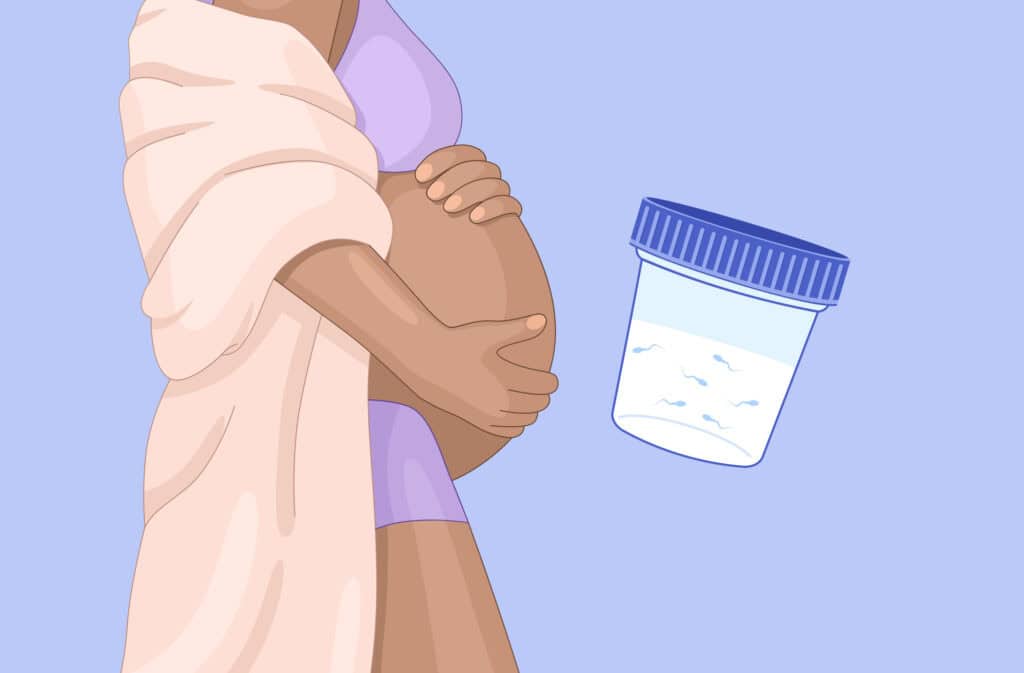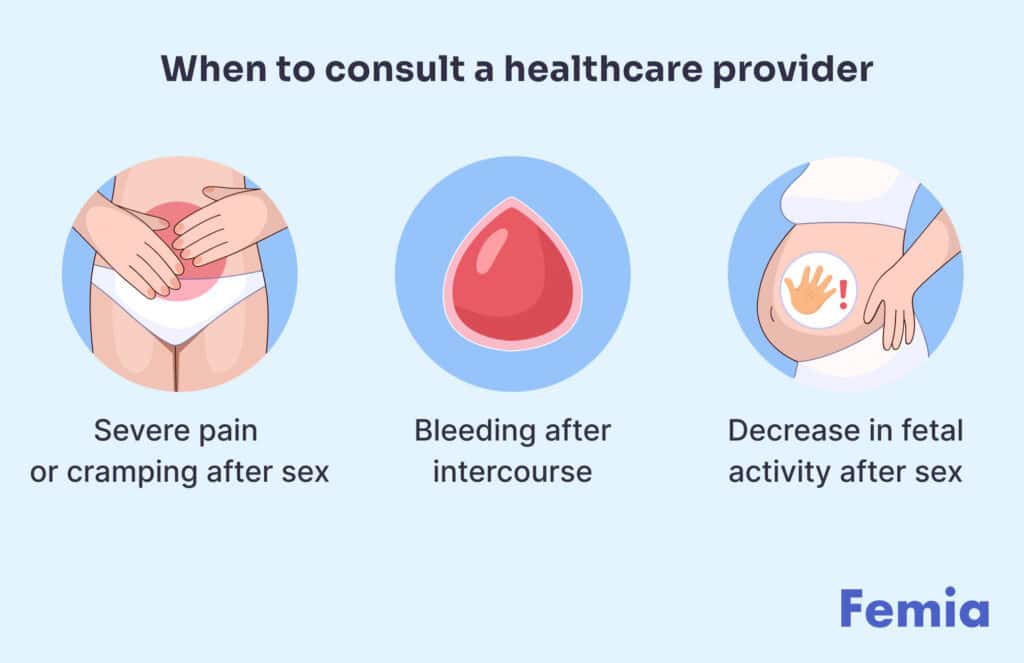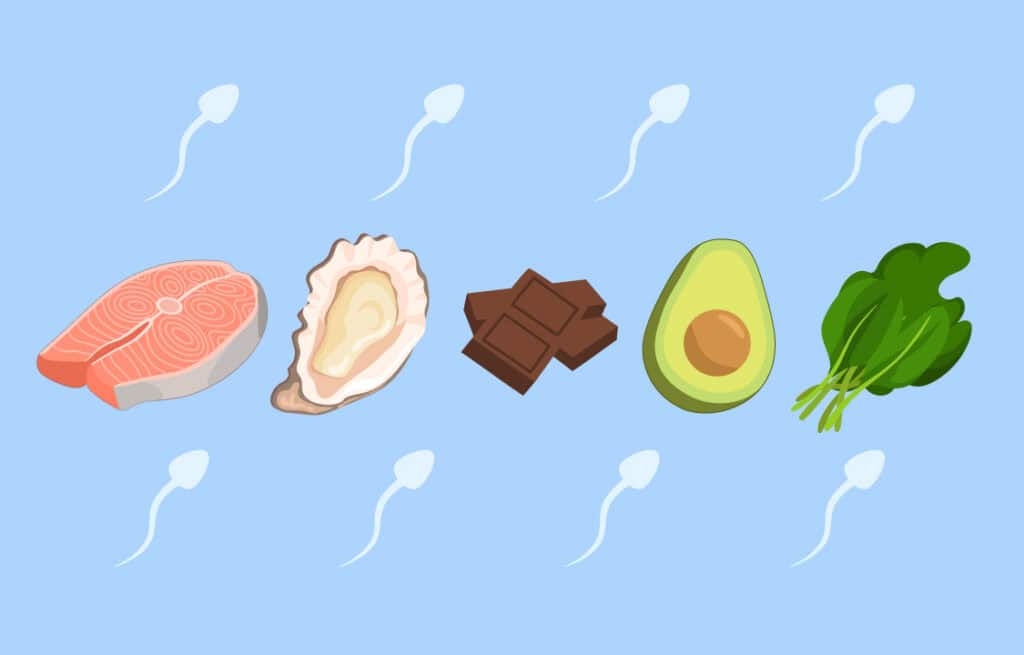Femia > Health Library > Pregnancy > Pregnancy health > Is sperm good for the baby during pregnancy? Understanding its impact and safety
Is sperm good for the baby during pregnancy? Understanding its impact and safety

- Updated Feb 10, 2025
- Published
CRAFTED BY HUMAN
Crafted by human At Femia, we provide accurate and up-to-date information at every stage of your journey, from trying to conceive, pregnancy and postnatal support. All content is created by a real person based on in-depth research and own professional experience. Femia ensures that you will receive expert advice, strict accuracy and a personalized approach from our authors/medical experts. Learn more about our editorial policy.
FACT CHECKED
Fact checked At Femia Health, we maintain the highest standards of editorial excellence in delivering content focused on helping you conceive, guiding you through pregnancy, and supporting you postpartum. Explore our content review principles to learn how we ensure the accuracy and quality of our health and lifestyle tips for every stage of your journey.
Unless you have pregnancy complications or a doctor’s warning, sex and sperm pose no threat to you or your baby:
- It doesn’t harm the fetus, as it’s protected by the mucus plug and amniotic sac.
- Sperm doesn’t directly affect the baby’s development or pregnancy progression.
Sexual activity can be beneficial for couples’ emotional connection and well-being.
There’s almost certainly going to be some unexpected chaos during your pregnancy. No one prepares us for the experience of growing life, and so much remains unclear and unsaid. It’s not unusual to find yourself worrying about the small details—you just want what’s best for your baby’s health. An extremely common question women have is whether or not it is safe, healthy, and advisable to have sex during pregnancy. Is it okay for sperm to enter your body during this delicate time?
About 80% of pregnant women and their partners become concerned about the safety of sex at some point during their pregnancy.
These concerns are in no way groundless, given the importance of maintaining your health along with the health of your growing child throughout your pregnancy. Therefore, our team at Femia has taken the time to consider the role sperm plays in a pregnant woman’s body and whether it can have a negative effect on the baby.
Femia helps millions of couples understand intimacy
and safety throughout pregnancy
Is sperm safe during pregnancy?
The idea that sperm can harm the fetus is an age-old myth known to cause distress among pregnant women.
However, according to medical experts and scientific research, sperm does not pose a threat to the baby during pregnancy.
Your baby is reliably protected by several barriers. First off, a mucus plug closes the entrance to the cervix and prevents bacteria and other foreign bodies from entering the uterus. Then, there is an amniotic sac, which protects the fetus from external influences. These natural barriers make it almost impossible for sperm to have any effect on the child.
So is ejaculating in a pregnant woman safe? To date, there is no scientific evidence that sperm in any way affects the development of the fetus or the course of pregnancy.
But it is also essential to note that if a woman has certain medical contraindications, such as risk of premature birth or infections, the doctor may recommend abstinence from sexual intercourse. In such cases, we always recommend following the recommendations of a healthcare provider.
If you have a medical contraindication, it’s good to know that sperm contains substances that can soften the cervix. As a result, sperm can potentially increase the chance of premature birth in some cases. The changes caused by sperm, however, are minor—a pregnant woman’s body generally regulates the substances in sperm to prevent them from having any effect on the fetus.
But if a woman is at risk of premature birth, doctors may recommend avoiding sexual intercourse to minimize any potential risk of changes to the cervix, which could lead to the onset of labor.
👉Find out more: Orgasms during pregnancy: Your questions and concerns answered
What happens to sperm during pregnancy?
Immediately after conception, your body begins to protect the baby. One of these protective measures is the formation of a mucus plug in the cervix. The plug is thick and jelly-like, and acts like a protective seal, helping to prevent bacteria, viruses, and other potential threats from entering your uterus.
What happens to the sperm when a woman is already pregnant? Sperm inside of the vagina either flows out naturally or is absorbed by the vaginal mucosa and then disposed of by the body. It is a completely safe process that does not negatively affect either the mother or the baby.
Can you conceive another baby while pregnant?
Theoretically, a woman can conceive a child while pregnant. Superfetation occurs when a woman conceives a second child while already pregnant. In most cases, once a woman becomes pregnant, her body stops ovulating, making it impossible for her to conceive again. But in extremely rare cases, of which there are only a few documented examples worldwide, one of three things can happen:
- Ovulation during pregnancy. Usually, hormonal changes suppress ovulation. However, in the case of superfetation, ovulation can occur even though the pregnancy has already occurred. It is an extremely rare occurrence.
- Fertilization of the second egg. Even if ovulation has occurred, superfetation requires that the second egg be fertilized by sperm.
- Implantation of the fertilized egg. Finally, the fertilized egg must successfully implant into the already pregnant uterus, which is a complex process.
How likely is superfetation?
Superfetation is so rare that only a few cases have been reported in medical literature. The likelihood of a woman conceiving a second child during pregnancy is extremely small. One of the most famous examples of superfetation is that of an Australian woman who conceived a second child 10 days after her first conception.
However, the phenomenon is considered so rare that doctors and researchers often doubt its possibility.
👉Find out more: Mucus plug vs. discharge: Understanding the differences
Another myth about sperm during pregnancy
Besides the myth that sperm can be dangerous for the fetus, there is another one—the exact opposite.
It is the claim that sperm has special beneficial properties and can positively affect the health of the fetus. For example, it is sometimes said that swallowing sperm can improve the immunity of the mother and child, or that sperm contributes to a smoother pregnancy.
These claims have no scientific basis. Scientific analysis has not found any special properties in sperm that directly affect the health of the baby.
Although sperm does contain nutrients and hormones, such as prostaglandins, they do not have a significant effect on pregnancy under normal conditions. Prostaglandins can help soften the cervix in late pregnancy, but their presence is generally not enough to have a significant effect.
Impact of sexual activity on pregnancy
Unless you have a doctor’s warning, sexual activity during pregnancy is safe. Pregnancy itself is not a contraindication for intimacy if it proceeds without complications.
During pregnancy, hormonal changes occur in the woman’s body that can affect sexual desire and satisfaction.
The hormones progesterone and estrogen play a key role in maintaining pregnancy. They promote the growth of the uterus, the formation of the placenta, and the preservation of the mucus plug in the cervix. Thanks to these mechanisms, sexual intercourse, including ejaculation, does not hurt the child.
About 80% of women continue to have sex throughout pregnancy and do not experience any complications.
Sexual activity during pregnancy can be critically important for a woman’s well-being. Intimacy helps to strengthen the emotional connection between partners, which is especially important during pregnancy. Regular sexual activity can help a couple maintain harmony and intimacy in their relationship, which in turn has a positive effect on the mental state of both partners.
Orgasms during pregnancy help improve blood circulation and increase endorphin levels, which can help reduce stress and improve overall well-being.
What to consider when having sex while pregnant?
Pregnancy can be awkward when it comes to sex. Sometimes, a woman’s growing belly comes with physical discomforts and potential risks. The experience of being pregnant may subsequently affect her sexual desire. There are several factors to consider when having sex while pregnant:
Comfort and positions
As the belly grows, some positions may simply become uncomfortable. For example, the classic missionary position can put pressure on the abdomen. In such cases, positions where the woman is on top or on her side may be more comfortable. It is also best to use pillows to support the abdomen and back to make intercourse more comfortable.
Communication
Discussing preferences, desires, and any possible discomfort during pregnancy is key. The woman should be able to freely express her expectations, while her partner listens and respects her wishes. Sensations can change throughout the pregnancy, so it can be helpful to talk with your partner regularly.
Hygiene and safety
If your partner has STIs, it is highly recommended to abstain from intercourse until the infection is treated. Otherwise, use barrier protection, such as condoms or dental dams, to reduce the risk of transmission.
Maintaining hygiene is also especially important during pregnancy because the immune system becomes weakened.
Intensity and rhythm
During pregnancy, the vaginal tissues may become more sensitive, so it is important to be attentive to the intensity and rhythm of intercourse.
Caring for the woman
Pregnancy can be very tiring, especially in the later stages. Regularly checking in with your partner about how you are feeling, your energy levels, and your preferences can help you avoid unnecessary stress. Remember that sometimes you may feel more comfortable with other forms of physical intimacy that do not include penetration.
Track your symptoms with Femia and get tailored
health advice right on your phone
Precautions and when to consult a healthcare provider
While sexual activity is considered completely normal during pregnancy, there are situations when it is better to avoid it. It is important to understand in the situations that can pose a risk to the health of a woman and her baby:
- History of premature birth. Women who have previously given birth prematurely are at risk of it happening again. In such cases, sex, especially with penetration, can be a cause for concern, since it can stimulate uterine contractions, which can increase the risk of preterm labor.
- Cervical insufficiency. Cervical insufficiency can cause the cervix to open or shorten too early, possibly leading to premature labor or even miscarriage. In these cases, doctors may recommend abstaining from penetrative sex to avoid putting extra pressure on the cervix to reduce the risk of complications.
- Placenta previa. Placenta previa occurs when the placenta partially or completely covers the opening of the cervix. When placenta previa is present, sex can lead to vaginal bleeding, which poses a risk to both mother and baby. In these cases, doctors often recommend abstaining from sexual activity.
If you have had preterm labor, it is best to constantly monitor your pregnancy and act on the advice of your doctor.
It is always smart to be mindful of your pregnancy and watch out for symptoms to tell your doctor about. If you notice any of the following, you should take note of your symptoms and tell your doctor about them as soon as possible:

- Bleeding after intercourse. During your pregnancy, bleeding after intercourse or for no apparent reason is a warning sign. It may indicate complications, such as placenta previa, which generally shows symptoms during the second half of pregnancy.
- Severe pain or cramping. If you experience severe pain or cramping after sex, especially if it lasts for a long time, it may be a sign of a problem that requires medical attention.
- Decrease in fetal activity. If you notice a decrease in fetal activity after sex, it may indicate stress in the baby. Be sure to consult with your doctor to find the solution that is best for you.
Pregnancy is a delicate time during which the health of both mother and child is of primary concern, so regular health check-ups are important to help avoid possible risks and complications.
Questions from the Femia community
Could being intimate with my partner put my pregnancy at risk?
Generally, sexual activity does not cause miscarriage. Chromosomal abnormalities or other medical issues typically cause miscarriages.
Will having sex near my due date affect how my labor starts or progresses?
Sperm contains prostaglandins, which can soften the cervix. That said, in normal pregnancies, it is not enough to induce labor. When the pregnancy is near full-term, some believe that sex might help with cervical ripening, but the effect is generally minimal.
If I've recently had sex, could it mess up the results of my pregnancy test?
No, sperm does not affect pregnancy test results. Pregnancy tests measure the hormone hCG in a woman's urine or blood, which is produced by the developing placenta. hCG is not influenced by sperm.
The bottom line
Is sperm good for the baby during pregnancy? Sperm and sex during pregnancy are healthy, normal, and not a cause for concern, unless you have certain risks. When sperm enters a woman’s body, it does not pose a threat to the mother or child, and the hormones it contains should not influence the start of a premature labor process.
Sexual activity during pregnancy can be very important for both partners, especially for the woman. Sexual intimacy can bring you pleasure and the chance to connect with your partner, which can play an important role in maintaining your well-being throughout the ups and downs of pregnancy.
References
- “Features of the sexual life during pregnancy.” Jelena Isajeva, Mindaugas Silkunas et al. 2012. Available at: https://www.researchgate.net/publication/304824384_Features_of_the_sexual_life_during_pregnancy.
- “Sexual intercourse during pregnancy and its association with spontaneous preterm birth.” Laura E. Janssen, Rubin J.T. Verduin, Christianne J.M. de Groot et al. 2023. Available at: https://www.sciencedirect.com/science/article/pii/S1877575623000393#ab005.
- “Nursing Problems.” Aldona Z. Miazga, Edyta Barnaś, Joanna Błajda, et al. 2023. Available at: https://www.termedia.pl/Selected-aspects-of-sexuality-in-pregnant-women,134,51936,0,1.html.
- “The influence of sexual activity on sleep: A diary study.” Carlotta Florentine Oesterling, Charmaine Borg, Elina Juhola, Marike Lancel. 2023. Available at: https://pubmed.ncbi.nlm.nih.gov/36646500/.

Discover the best foods and nutrients that can enhance your sperm quality and boost your fertility. Combine sperm—boosting nutrients with a healthy lifestyle to optimize reproductive health.

A guide to UTIs covering the basics. Causes, symptoms, and how long do they take to clear up? Plus, the answer to the question can you have sex with a UTI?

Orgasm occurs at the peak of sexual arousal. The brain releases hormones during orgasm that play a vital role in the pleasure, connection, and relaxation that follows.

